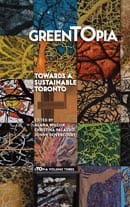by Lizzie
GreenTOpia should be read by every politician at the civic, provincial and federal levels. It should be highlighted at the front of every Toronto library and featured as a Toronto Reads book on CBC’s Metro Morning. High school teachers should incorporate parts into their classes. Excerpts of it should be painted in subway stations. And, most importantly, it should be read by you.
The previous two uTOpia books thrilled me with their optimism for Toronto, unapologetic pie in the sky ideas and peeks into the secrets that make this city special to different people. GreenTOpia has raised the bar even higher.
This time the editors invited immodest proposals for how Toronto can become a greener city and a world leader in the fight against global warming and fossil fuel dependence. This more defined focus – when combined with the series’ characteristic openness towards diverse perspectives, lengths and tones – makes for a book that leaves you with a real sense of optimism, showing you how many effective and inspired ideas can be generated when creative minds are united in purpose.
Reading this book felt equivalent to attending a semester’s worth of university courses taught by hip, pop-cultured professors in departments as diverse as Forestry, History, Urban Planning, Equity Studies, Architecture and Philosophy. I learned so much, without ever feeling bogged down by dry facts. Did you know that it is illegal to take something, like an old book, from your neighbour’s trash? How ridiculous is that? Or that there is a diaper-free baby movement that calls for parents to simply look for cues from their kids and throw them on a potty or a newspaper or whatever when you think they’re going to shit? So many interesting details, with many fascinating graphics to boot. I particularly liked the one that mapped out all the grow-ops in the city and suggested they could be turned into urban agriculture sites. Makes sense.
My favourite pieces were from two extremes: those that suggested seemingly small, but powerful changes, and those that advocated sweeping value shifts. Small, powerful ideas included painting a line around the city to mark the ideal boundary of urban sprawl and installing dog poo composters in city parks. Value change proposals included a piece that suggested we should accept that environmental change is sometimes ugly, not all about butterflies, and another that battled the middle class taboo of salvaging other people’s garbage.
Along with Adria Vasil’s Ecoholic that I reviewed last week, GreenTOpia should be a tome on every Torontonian’s bookshelf. It will leave you feeling hopeful and spur you into action. Volunteer with the composting toilet in Dufferin Grove . . . serve on a river council . . . attend a bike repair workshop for women . . . grow a vegetable patch in unused grassy areas around local schools . . . and on and on and on.



 Follow Us On Instagram
Follow Us On Instagram
